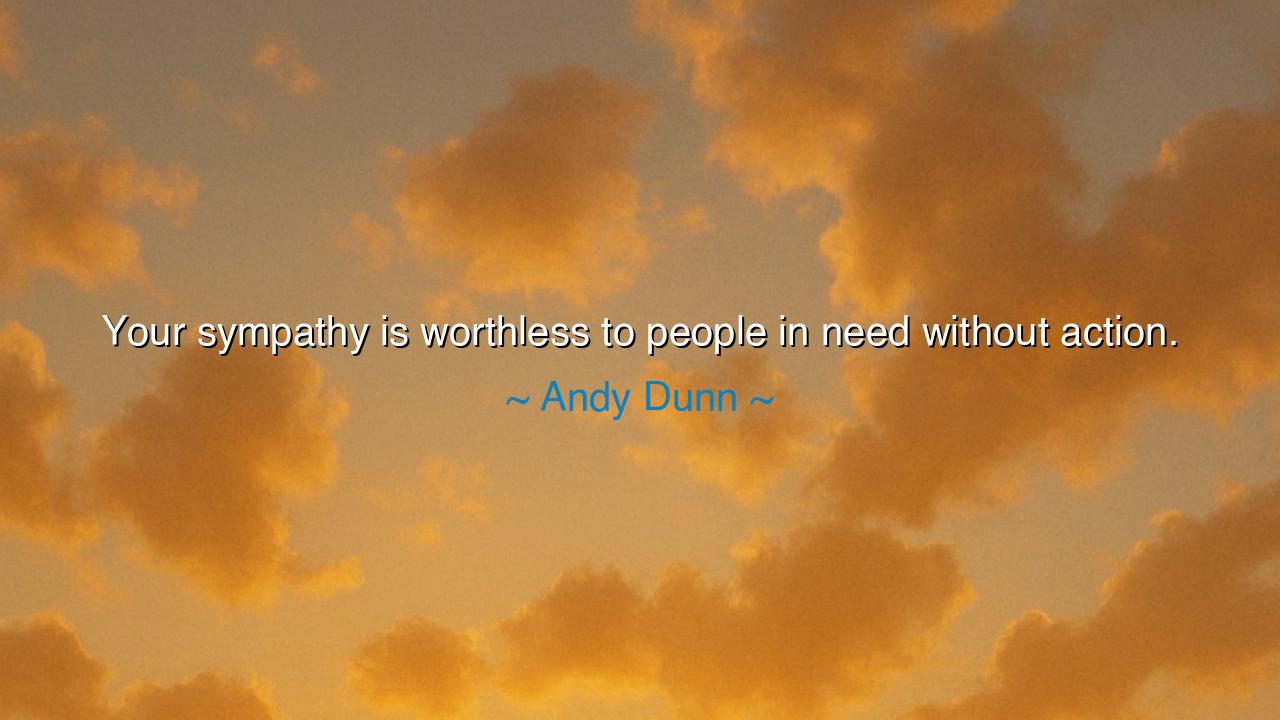
Your sympathy is worthless to people in need without action.






Hear the fiery words of Andy Dunn, entrepreneur and thinker, who declared: “Your sympathy is worthless to people in need without action.” In this utterance lies a truth sharper than any blade: that compassion without deeds is but smoke, vanishing into the air. To feel sorrow for another’s suffering yet to lift no hand in their aid is not kindness but a hollow ritual, a self-consolation that leaves the wounded unhealed and the hungry unfed.
When Dunn speaks of sympathy, he names the stirring of the heart, that impulse which awakens when we witness suffering. Yet he warns that such feeling, though noble in its spark, dies quickly if not transformed into action. For the poor do not eat the tears of the compassionate, nor do the oppressed find liberty in the sighs of the well-meaning. True mercy is not in sentiment but in sacrifice, not in the warmth of words but in the labor of hands.
The origin of such wisdom lies in the eternal divide between intention and deed. For ages, men and women have mistaken pity for virtue, believing that to feel deeply is enough. But the sages and prophets of old knew otherwise. Did not James, the apostle, write that faith without works is dead? And did not the Good Samaritan prove his compassion by binding wounds and giving shelter, while others passed by with only thoughts and prayers? So too does Dunn stand in this lineage, reminding us that sympathy must be incarnate, clothed in action, to have worth.
History resounds with examples of this truth. Consider the famine of Bengal in 1943, where millions starved. There were speeches, there was pity, there were words of sorrow spoken in faraway halls. But food was not delivered, and ships did not sail. The people perished, not for lack of sympathy, but for lack of action. In contrast, when Mother Teresa walked the streets of Calcutta, she did not speak only of pity—she stooped, she touched, she carried, she built. Her compassion had weight because it moved her hands as well as her heart.
The deeper meaning is this: sympathy without action is self-centered, a mirror in which we admire our own sensitivity. But when feeling is transformed into deed, it ceases to be about the self and becomes service to the other. The sick need medicine, not musings. The lonely need presence, not platitudes. The suffering need justice, not only gentle words. And only when we cross the threshold from feeling to doing does our compassion become real in the eyes of the world.
Beloved listener, take this wisdom into your own life. When you see hunger, do not only grieve—give bread. When you hear of injustice, do not only sigh—raise your voice and take a stand. When you meet loneliness, do not only acknowledge—sit beside it with warmth. Let every stirring of sympathy within you find expression in action, for in action lies the proof of the heart’s sincerity.
Therefore, let your days be marked not only by the feelings you carry, but by the deeds you perform. Do not let your sympathy be empty coin, but spend it in the marketplace of life as food, shelter, justice, and love. For as Andy Dunn reminds us, the world does not need more pity—it needs hands that build, feet that walk, and voices that speak.
Thus his words endure as a summons: “Your sympathy is worthless to people in need without action.” Remember this, and let your compassion move like a river—flowing outward, nourishing others, turning grief into healing and hope into reality.






AAdministratorAdministrator
Welcome, honored guests. Please leave a comment, we will respond soon